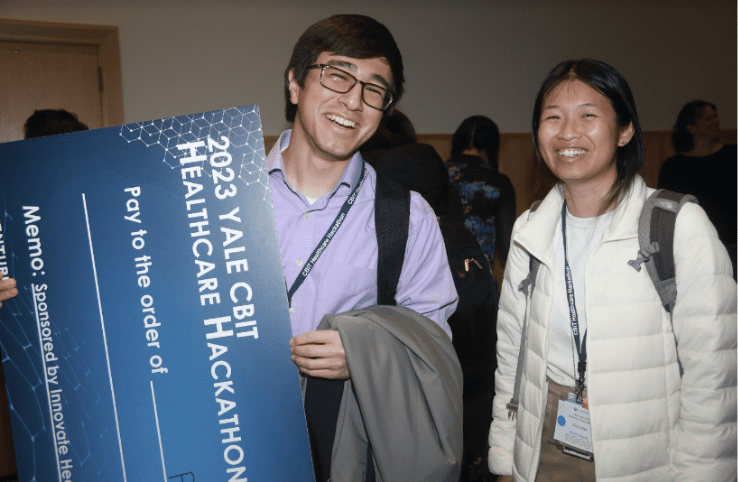Yale CBIT’s healthcare hackathon returns in person
About 250 participants registered for the Yale Center for Biomedical Innovation and Technology hackathon, drawing a diverse group to create innovative solutions in healthcare.

Courtesy of Kvon Photography
The Yale Center for Biomedical Innovation and Technology held its first in-person healthcare hackathon since the start of the pandemic this week.
With about 250 people registered to compete across 15 teams, the event kickstarted on Feb. 24 with keynote addresses on the hackathon’s theme, which this year was “patient engagement.” Participants heard from Indira Negi, the deputy director of global health at the Bill & Melinda Gates Foundation.
The purpose of the hackathon was to “provide an opportunity for people who are not clinicians or medical professions to tackle problems in healthcare,” according to Monica Manmadkar, an undergraduate at Columbia University who also served as the hackathon’s advertising and marketing lead.
“If you create a space of freedom and include a diversity of people, beautiful solutions can arise,” said physician executive Michael O’Brien MED ’16, who served as a mentor for the hackathon.
Hackathon participants pitched their ideas in fast-paced one-hour meetings on Friday afternoon and Saturday morning. Their projects could fall into one of four tracks related to this year’s theme: personalized therapy, patient monitoring, women’s health or digital therapeutics. Networking and team formation began shortly after.
In 24 hours, participants came up with project ideas ranging from a webpage that provides educational resources and community support to parents of children facing mental health and substance abuse to customizable journals that commemorate the medical journey of children fighting with cancer.
Participants came from a wide variety of backgrounds, ranging from high school and undergraduate students to professionals in various fields such as finance, marketing, business operations and academia.
Hackathon participant Angelin Mathew ’25 said that although her team members came from different parts of the world, they could all testify to how stigma affects patients’ healthcare experiences.
“It was my first hackathon, and it was so exciting to see how much we were able to think through and design in a weekend,” Mathew said.
Throughout the competition, there were “floating mentors” and a “genius bar” which allowed participants to gain early guidance from a team of multidisciplinary mentors through practice
presentations that took place prior to the final presentation on Sunday. The mentors’ specialities included entrepreneurship, technology, business, medicine, science, design and law.
O’Brien, who worked as a mentor this year, was actually a participant himself in 2020, and said that the hackathon had been “life-changing.” Prior to the event, he had practiced medicine as a physician for about 20 years. He found that the hackathon allowed him to combine his clinical expertise with people with backgrounds drastically different from his own to solve problems that otherwise felt stagnant in healthcare.
O’Brien’s son also joined the hackathon in 2021, which took place virtually due to the pandemic. As a high school student, he was “a master of Google Slides from school and designed the slide deck for his team’s presentation,” according to O’Brien.
The hackathon sparked O’Brien’s son’s enthusiasm for coding — two years later, he had already participated in the MIT Scratch program and taught himself Python.
The winning teams were announced on Sunday after participants delivered a three-minute presentation of their project followed by two minutes of questions from the judges. Kyle Feliciano ’26 and Emily Qian ’26, two students from the Yale School of Medicine, won the honorable mention $1,000 prize with their app PlayFit, which aims to help encourage physical activity in youth through video game incentives.
The app gathers “activity indicators – like step count, heart rate, and general activity level – from the wearable technology a child might already be using,” and then provides the user with an in-game reward “after a certain amount of activity has been accomplished,” according to a description written by the team.
The team that won the $5,000 Rothberg Grand Prize designed “Emma’s Story,” which is “a journal to be created by pediatric oncology patients documenting their journey of cancer treatment, celebratory milestones, and positive memories,” according to team members Jhonatan Nagasako, Zora Luan, Obinna Anosike and Andrea Orane MPH ’92.
The project idea emerged on Friday after multiple team members recounted their personal stories of battling diseases. They built prototypes of the journal overnight out of cardboard boxes, with cartoonish patterns and vibrant colors. They wanted the journal to appear relatable to a child fighting cancer.
“Because we were such a small group, everyone’s idea[s] mattered,” Nagasako said.
The team will meet with advisors from CBIT and others from the Yale community to get further feedback on the design.
Mark Saltzman and Maxwell Laurans are the faculty co-directors of the Yale Center for Biomedical Innovation and Technology.
Correction 3/1: A previous version of this article misstated the keynote speaker and O’Brien’s current occupation.
Correction 3/6: A previous version of this article misspelled Luan’s surname.







